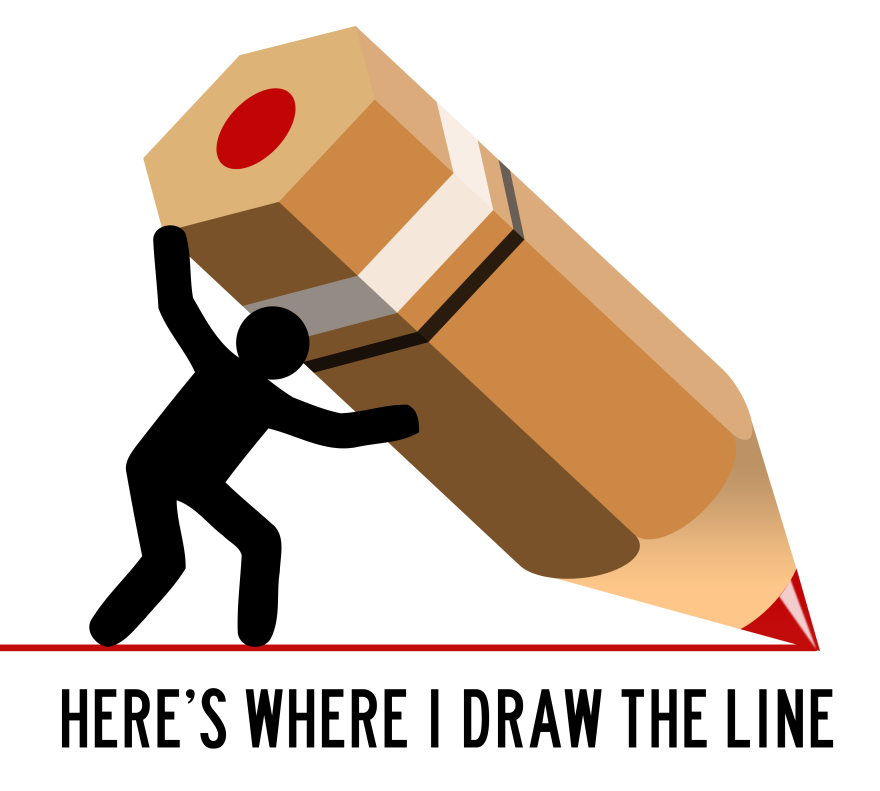PERSONAL NOTE
First a big shout out to my baby brother, Happy Birthday Earl!! I couldn't have asked for a better brother, you're the best!
Do you ever find that you sometimes just have to laugh at yourself because you were being silly or just weren't paying attention to what you were doing at the time? Well, I have made thousands of pots of coffee during my life and this one morning my body was up and apparently my brain was still in bed. I put the water in the machine, I put the filter in, I added the cinnamon, plugged it in, and turned it on and you guessed it I had a pot of hot cinnamon water....I forgot the coffee grounds...oops! I had a good laugh, redid the process with coffee this time, and immediately texted my girlfriend so she could laugh with me. Just thought I'd share and see what silly things you might have done in the past. Please send me an email and let me know (it will not get published).
ARTICLE
My article this month applies only to personal boundaries in the physical world not to social media in cyberspace. Social media has destroyed boundaries and hurt countless people in the process. There is no boundary or personal protection when you can be ridiculed or shamed by someone that could even be on another continent because they didn't like one word you used or maybe they didn't like the shape of your nose. So please don't expect boundaries in cyberspace and enter at your own risk. Now on to the boundaries in the physical world.

It's Okay to Build Fences: Setting Healthy Boundaries
“Good fences make good neighbors.” So goes the old saying from the well-loved Robert Frost poem.
Likewise, good personal boundaries make for good relationships. Boundaries are those invisible lines of protection you draw around yourself, your personal lines in the sand. They let people know your limits on what they can say or do around you. Healthy boundaries give you freedom in relating to others. Make them too solid and you build walls, too weak and you allow others’ actions to harm you.
It’s not always clear where our boundaries are or need to be as many of these have been developed over the years. Recognizing and studying the signs of ignored or ineffective boundaries is a good place to start, as these “symptoms” give clues to the needed boundary. See if any of the following ring true for you.
 Aloofness and distance. When you are unwilling or fearful of opening your space to others, or when you build walls to ensure that others don’t invade your emotional or physical space, this may be a defense against cruel behavior, abuse, or neglect that happened to you in the past. A person with healthy boundaries draws a line over which they will not allow anyone to cross. They recognize their right to say, “No!” Aloofness and distance. When you are unwilling or fearful of opening your space to others, or when you build walls to ensure that others don’t invade your emotional or physical space, this may be a defense against cruel behavior, abuse, or neglect that happened to you in the past. A person with healthy boundaries draws a line over which they will not allow anyone to cross. They recognize their right to say, “No!”
Chip on the shoulder. This kind of attitude declares, “I dare you to come too close!” and is often the result of anger over a past violation or ignoring of your physical or emotional space by others. Healthy boundaries mean you can to speak up when your space has been violated, leaving you free to trust that you can assertively protect yourself to ensure you are not hurt.
Cult-like connection. In this game, the rule is that everyone must do everything together, and everyone must think, feel and act in the same way, without deviation from group norms. Healthy boundaries acknowledge that you have the right to explore your own interests, hobbies, and outlets.
Invisibility. The goal here is not to be seen or heard so that your boundaries are not violated. Healthy boundaries are in effect when you stand up for yourself—be visible, be heard—so that others can learn to respect your rights, needs, and personal space.
Dissociation. If you “blank out” or “go away” during stressful emotional events, it results in your being out of touch with your feelings and unable to assert your limits. Healthy boundaries allow you to assertively protect yourself from the further violation or hurt, and to choose to end relationships with those who will not respect them. With healthy boundaries, you can begin to feel your feelings again.
Smothering and lack of privacy. When another is overly concerned about your needs and interests, or when nothing you think, feel or do is your own business, it can be intrusive into your emotional and physical space, leaving you feeling overwhelmed or like you are being strangled. Healthy boundaries ask that others respect your uniqueness, your choices, and your autonomy.
Applying Boundaries
 Once we see where our limits need to be clarified or put into place, we can begin to install fence posts or patch holes, to keep unwanted critters out. Here are some strategies for applying limits when your boundaries are intruded upon: Once we see where our limits need to be clarified or put into place, we can begin to install fence posts or patch holes, to keep unwanted critters out. Here are some strategies for applying limits when your boundaries are intruded upon:
- Calm yourself and take deep breaths.
- Remind yourself of your right to set limits.
- In a firm and composed manner, tell the other person how you feel.
- Communicate clearly what your limits are, especially when you are extending a new boundary.
- Ask the other person to respect your boundaries.
- If it's a new boundary in an existing relationship it may take some time and patience to establish.
- Make decisions about the relationship according to how the other person responds to your request, especially if it's a brand-new relationship.
COOL RESOURCE
I have an amazing friend and colleague, Danita Sparling, who was on a podcast about a month ago speaking about boundaries. I have included the link for your listening pleasure https://tinyurl.com/2hhk5nvv. (Approx. 50 min) She is very insightful and brings up a lot of great points about having and setting boundaries. She can be reached at Sparling Life Coaching | Ignite Your Light if you would like to get more information from her.
CONNECT WITH ME
Linked In
Please let me know if there are particular items you would like me to cover in upcoming newsletters. Just email me at jancerasaro@yccbe.com
Stay safe, healthy, and happy!
Coach Jan
|